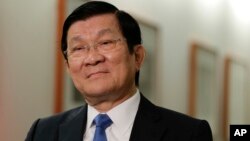Vietnam's President Truong Tan Sang has publicly rejected sovereignty claims by Chinese President Xi Jinping over disputed islands in the South China Sea.
Speaking at the Asia Society in New York late Monday, President Truong Tan Sang made a forceful case for Hanoi's claim to the chain, known as the Spratlys in Vietnam and Nansha islands in China.
The Chinese leader, who just completed a state visit to the United States, including a speech to the U.N. General Assembly, recently told the Wall Street Journal that “the Nansha [Spratly] Islands have been China’s territory since ancient times."
When asked by VOA’s Vietnamese Service about his reaction to Xi’s statement, Sang reiterated Vietnamese claims over the islands.
“The Chinese, in meetings with us, always claims that the islands belong to China, and it is undisputable," he said. "We would like to counter-argue that statement. The Paracels and Spratlys belong to Vietnam since ancient time, and it is also undisputable.”
Sang, who made a state visit to the U.S. in July, added that Hanoi also has “historical and legal evidence" for its claim.
He also urged other claimants to pursue peaceful solutions to the maritime disputes over the South China Sea.
"[Vietnam] would like to resolve the issue through international laws, and that is the only way to go forward. Regarding bilateral issue [the Paracels] between Vietnam and China, we will negotiate with other bilaterally," Sang said. "Other multilateral ones such as the Spratly issue, which is related to six parties, then all sides should deal with China.”
Vietnam and China claim sovereignty over the Paracel Islands, while the two nations also have competing claims with the Philippines, Brunei and Malaysia over the Spratlys.
Sang’s statement, viewed as a stand-up against the giant northern neighbor, has drawn praise on line.
Vietnamese officials have long been criticized by bloggers and other dissidents for being submissive in territorial disputes over the South China Sea.
In a speech to the UN General Assembly yesterday, President Barack Obama said the U.S. has “an interest in upholding the basic principles of freedom of navigation and the free flow of commerce, and resolving the disputes through international law, not the law of force.”
The U.S., which has said it will not take sides in the maritime disputes, has also called on all parties to avoid provocative actions that raise tensions.
Last year, Beijing was sharply criticized by Vietnam when it placed an oil rig in disputed waters, leading to several small maritime confrontations and deadly rioting in mainland Vietnam.
Lately, Chinese efforts to reclaim land in the South China Sea has come under fire from several countries.
This report was produced in collaboration with the VOA Vietnamese service.







